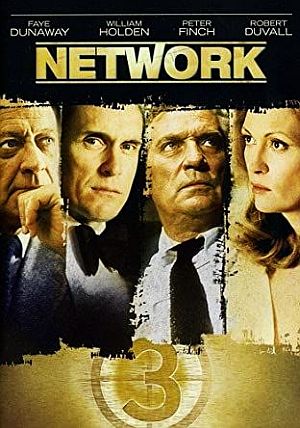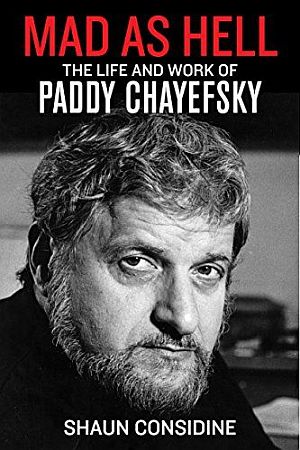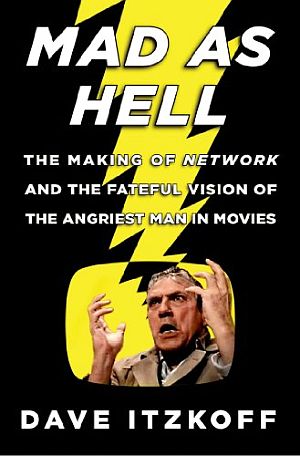
Poster for the 1976 film “Network,” using scene from famous “corporate cosmology” rant by network executive.
“Network” received widespread critical acclaim, with particular praise for the performances of its actors. It received 10 Oscar nominations, including “Best Picture” (though losing to “Rocky”). The film was a commercial success and won four Academy Awards – Best Actor (Finch), Best Actress (Dunaway), Best Supporting Actress (Straight), and Best Original Screenplay (Chayefsky).
In 2000, the U.S. Library of Congress selected the film for preservation in the National Film Registry for its cultural significance.
But apart from the kudos, among its most enduring and memorable scenes – and there are several – is one in which an imposing corporate executive, Arthur Jensen, played impressively by Ned Beatty, proceeds to lecture and excoriate recently rising network news star, Howard Beale, who has riled up the nation with his populist rantings. But before sharing that scene and its articulate, instructive speech, a bit of background is in order.
Howard Beale, played by Peter Finch, is the longtime anchor of the Evening News show for the UBS TV network. Described as “the grand old man of news,” Beale, for many years, was a network stalwart with high ratings and good audience share. But in later years, his fortunes began to decline, and his ratings fell. His wife also died, and he became depressed and drank heavily as his audience share continued to slide.
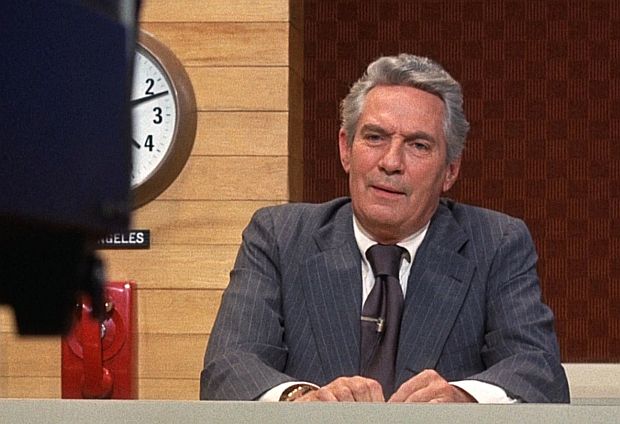
Howard Beale ( Peter Finch ), “grand old man of news” at UBS-TV, shown at his news desk in a more sedate pose than his later “angry man” broadcasts. Still, during this broadcast he tells his audience he is bing fired for low ratings and on his next broadcast he will “blow his brains out” on live TV.
At the outset of the film, Beale has learned from his friend and direct boss – news division president, Max Schumacher, played by William Holden – that he will soon be fired because of his poor ratings. The two friends then proceed to get drunk, reliving their glory days as upcoming newsmen, and lamenting the state of their industry. Beale, however, on his next nightly news broadcast, announces to the world he will commit suicide on the air during an upcoming broadcast.
In the control room, pandemonium ensues as the staff can’t believe what they’ve heard. In the front office too, executives are scrambling, as phones erupt and the other three networks are all broadcasting live about “what Howard Beale has said.” UBS then fires Beale, but Max Schumacher intervenes on his behalf and Beale agrees to apologize on air, and is given another chance. But during his next broadcast, Beale proceeds to launch into another tirade, charging among other things, that life is “bullshit.”
This outburst, however, causes Beale’s newscast’s ratings to spike, and that catches the notice of the UBS front office, and in particular, programming chief Diana Christensen, a role played with obsessive passion by Faye Dunaway. Christensen is an aggressive, “anything-for-ratings” power player at UBS.
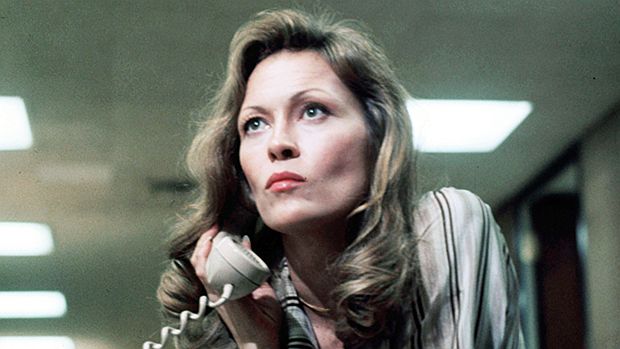
Diana Christiansen, the hard-charging, no-nonsense director of programming at UBS-TV, played by Faye Dunaway, sees a ratings gold mine in the “angry man” tirades of newsman, Howard Beale.
Beale’s being fired for his rant had made headline news, as the story appeared on the front pages of New York’s biggest newspapers – and Diana noticed. Having collected the morning papers on her way to the office, she muses out loud to her secretary as she pages through the paper, perusing the news stories of the day:
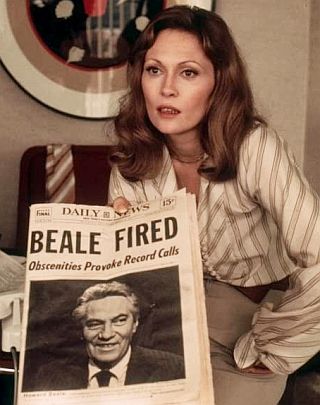
Diana Christensen (Dunaway) with “Daily News” front page on Beale with sub-head: “Obscenities Provoke Record Calls,” which she uses to lobby Frank Hackett (Duvall).
She then arranges to have a short meeting with UBS executive Frank Hackett and begins by hyping the overnight ratings that Beale’s show has garnered:
Diana Christensen: Did you see the overnights on the Network News? It has an 8 in New York and a 9 in L.A. and a 27 share in both cities. Last night, Howard Beale went on the air and yelled bullshit for two minutes, and I can tell you right now that tonight’s show will get a 30 share at least. I think we’ve lucked into something.
Frank Hackett: Oh, for God’s sakes, are you suggesting we put that lunatic back on the air yelling bullshit?
Diana Christensen: Yes, I think we should put Beale back on the air tonight and keep him on.
Diana Christensen: Did you see the news this morning? Did you see the [New York] Times? We got press coverage on this you couldn’t buy for a million dollars. Frank, that dumb show jumped five rating points in one night. Tonight’s show is gonna be at least fifteen. We’ve just increased our audience by twenty or thirty million people in one night! And you’re not going to to get something like this in your lap for the rest of your days and you can’t just piss it away. Howard Beale went up there last night and said what every American feels, that he’s tired of all the bullshit! He’s articulating the popular rage! I want that show, Frank. I can turn that show into the biggest smash on television.
Frank Hackett: What do you mean you want that show? It’s a News show. It’s not your department.
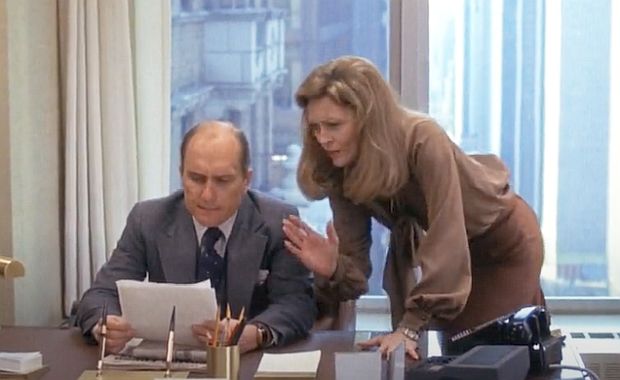
Diana applying the "full court press" to UBS executive Frank Hackett to keep Howard Beale on the air, calling him a "latter day prophet" who is "articulating the popular rage". Diana also wants Frank to move Beale's show from News to Entertainment.
Diana Christensen: I see Howard Beale as a latter day prophet. A magnificent messianic figure in vain against the hypocrisies of our times! A strip Savonarola, Monday through Friday, that I tell you Frank will just go through the roof! And, I’m talking about a six dollar cost per thousand show. I’m talking about a hundred, a hundred and thirty thousand dollar minutes and you ought to figure out the revenues of a strip show that sells for a hundred thousand bucks a minute! One show like that could pull this whole Network right out of the hole. Now, Frank, it’s being handed to us on a plate, let’s not blow it.
Frank Hackett: …Let me think it over.
Diana Christensen: Frank, let’s not go to committee about this. It’s twenty after ten, and we want Beale in that studio by half-past six. We don’t want to lose the momentum —
Frank Hackett: For God’s sakes, Diana, we’re talking about putting a manifestly irresponsible man on national television. I’d like to talk to Legal Affairs at least… And Standards and Practices…. I’m the one whose ass is going on the line….
Frank says he’ll think about it, but Diana has essentially sold him on the idea, and he decides to go with it. The network will exploit Beale’s sudden popularity and keep him broadcasting.
“Mad As Hell”

Howard Beale on UBS-TV, as he begins to become “the mad prophet of the air waves,” with a national following.
Back at the studio, there is disagreement over Howard’s emotional state, but the network keeps him on the air. That evening, minutes before his show begins, Beale walks into the studio soaking wet, still in overcoat and pajamas. On the air, he complains to his audience about the ills of society:
…We know things are bad – worse than bad. They’re crazy. It’s like everything everywhere is going crazy, so we don’t go out anymore. We sit in the house, and slowly the world we are living in is getting smaller, and all we say is: ‘Please, at least leave us alone in our living rooms. Let me have my toaster and my TV and my steel-belted radials and I won’t say anything. Just leave us alone.’
Well, I’m not gonna leave you alone. I want you to get MAD! … I don’t know what to do about the depression and the inflation and the Russians and the crime in the street. All I know is that first you’ve got to get mad. (shouting) You’ve got to say: ‘I’m a human being, god-dammit! My life has value!’
So, I want you to get up now. I want all of you to get up out of your chairs. I want you to get up right now and go to the window. Open it, and stick your head out, and yell: ‘I’m as mad as hell, and I’m not gonna take this anymore!’
Diana Christiansen, monitoring the broadcast, receives calls from UBS affiliates around the country, reporting that people are doing exactly what Beale has asked them to do. She is ecstatic. In New York, too, similar reports are coming in. Now billed as “the mad prophet of the airwaves,” Howard Beale skyrockets in the ratings. His passionate on-air rantings have galvanized the nation. And along the way, he makes some salient observations:
“…[L]ess than three percent of you people read books! …Less than fifteen percent of you read newspapers! Because the only truth you know is what you get over this tube….”
“…Television is not the truth! Television is a God-damned amusement park! Television is a circus, a carnival, a traveling troupe of acrobats, storytellers, dancers, singers, jugglers, side-show freaks, lion tamers, and football players. We’re in the boredom-killing business!…”
The Howard Beale Show later loses some of its appeal, but Diana revs it up by adding more entertainment content, though the Howard Beale segment is still the main draw.
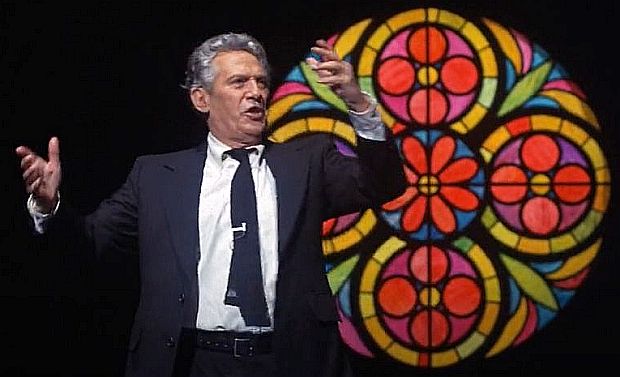
Howard Beale holding forth on his show, now cast in more of an “entertainment” format, with Beale roaming the stage and walking the aisles, visiting his live audience as he makes his pronouncements.
The Arab Deal
Beale later discovers some internal business news about the UBS network that fuels more of his on-air outrage. He has learned that Communications Corporation of America (CCA), the conglomerate that owns UBS, will be taken over by a giant Saudi Arabian conglomerate. Beale then uses his broadcast perch to rail against the takeover, urging viewers to send telegrams to the White House to stop the deal. Here’s part of what he says (for context, this was the mid-1970s, during the time of the Arab oil embargo when huge amounts of money had moved their way):
“…The Arabs are simply buying us. There’s only one thing that can stop them. You! You!…”…We all know that the Arabs control sixteen billion dollars in this country. They own a chunk of Fifth Avenue, twenty downtown pieces of Boston, a part of the port of New Orleans, an industrial park in Salt Lake City. They own big hunks of the Atlanta Hilton, the Arizona Land and Cattle Company, the Security National Bank in California, the Bank of the Commonwealth in Detroit. They control ARAMCO, so that puts them into Exxon, Texaco, and Mobil Oil. They’re all over – New Jersey, Louisville, St. Louis Missouri. And that’s only what we know about! There’s a hell of a lot more we don’t know about because all of the those Arab petro-dollars are washed through Switzerland and Canada and the biggest banks in this country.
For example, what we don’t know about is this CCA deal and all the other CCA deals. Right now, the Arabs have screwed us out of enough American dollars to come right back and with our own money, buy General Motors, IBM, ITT, AT&T, DuPont, US Steel, and twenty other American companies. Hell, they already own half of England.
“…By midnight tonight, I want a million telegrams in the White House. I want them wading knee-deep in telegrams at the White House….”So listen to me. Listen to me, god-dammit! The Arabs are simply buying us. There’s only one thing that can stop them. You! You! So, I want you to get up now. I want you to get up out of your chairs. I want you to get up right now and go to the phone. I want you to get up from your chairs, go to the phone, get in your cars, drive into the Western Union offices in town. I want you to send a telegram to the White House. By midnight tonight, I want a million telegrams in the White House. I want them wading knee-deep in telegrams at the White House. I want you to get up right now and write a telegram to President Ford saying: ‘I’m as mad as hell and I’m not gonna take this anymore! I don’t want the banks selling my country to the Arabs! I want the CCA deal stopped now!’ I want the CCA deal stopped now.
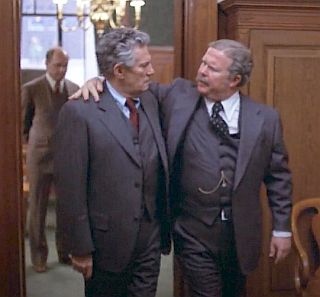
At CCA headquarters in New York, CCA Chairman Arthur Jensen escorts Howard Beale into the boardroom for a little chat.
In New York
Back East, at CCA headquarters, Beale’s rant has also caused a furor, and a call from the Chairman’s office goes out to Frank Hackett. He is told to bring Howard Beale to New York City the next day for a 10 a.m. meeting with CCA chairman, Arthur Jensen. Jensen is played memorably by Ned Beatty.
As Hackett and Beale arrive at corporate headquarters the next morning, it appears the meeting between Beale and Jensen will be cordial, as Jensen, making business small-talk with Beale, courteously escorts him into a large CCA boardroom for a private discussion.
Beale is seated at one end of the long boardroom table lined with green-shaded banker’s lamps on each side. Jensen then draws the floor-to-ceiling drapes over a window to darken the room. He then takes a standing position at the opposite end of the long boardroom table.

In New York, Howard Beale is seated at the far end of CCA boardroom table, as CCA Chairman, Arthur Jensen (Ned Beatty) begins to excoriate and instruct Beale, charging that he has “meddled with the primal forces of nature” -- meaning money and business.
Jensen then, in a bellicose opening, proceeds to set Beale right about the way things are, instructing him on the ruling “corporate cosmology,” and why he must adopt this credo as his new TV message. Here’s Jensen’s remarks to a shaken Beale (speech appears in full below film clip):
Jensen: You have meddled with the primal forces of nature, Mr. Beale, and I won’t have it!! Is that clear?!
You think you’ve merely stopped a business deal. That is not the case. The Arabs have taken billions of dollars out of this country, and now they must put it back! It is ebb and flow, tidal gravity! It is ecological balance!
You are an old man who thinks in terms of nations and peoples. There are no nations. There are no peoples. There are no Russians. There are no Arabs. There are no third worlds. There is no West. There is only one holistic system of systems, one vast and immane, interwoven, interacting, multivariate, multinational dominion of dollars.“…There is no America. There is no democracy. There is only IBM and ITT and AT&T and DuPont, Dow, Union Carbide, and Exxon. Those are the nations of the world today.” Petro-dollars, electro-dollars, multi-dollars, reichmarks, rins, rubles, pounds, and shekels.
It is the international system of currency which determines the totality of life on this planet. That is the natural order of things today. That is the atomic and subatomic and galactic structure of things today! And YOU have meddled with the primal forces of nature, and YOU WILL ATONE!
Am I getting through to you, Mr. Beale?
You get up on your little twenty-one inch screen and howl about America and democracy. There is no America. There is no democracy. There is only IBM and ITT and AT&T and DuPont, Dow, Union Carbide, and Exxon. Those are the nations of the world today.
What do you think the Russians talk about in their councils of state — Karl Marx? They get out their linear programming charts, statistical decision theories, minimax solutions, and compute the price-cost probabilities of their transactions and investments, just like we do.
Jensen describes, “one vast and ecumenical holding company, for whom all men will work… [and] in which all men will hold a share of stock – all necessities provided, all anxieties tranquilized, all boredom amused.”We no longer live in a world of nations and ideologies, Mr. Beale. The world is a college of corporations, inexorably determined by the immutable bylaws of business. The world is a business, Mr. Beale. It has been since man crawled out of the slime. And our children will live, Mr. Beale, to see that perfect world in which there’s no war or famine, oppression or brutality — one vast and ecumenical holding company, for whom all men will work to serve a common profit, in which all men will hold a share of stock, all necessities provided, all anxieties tranquilized, all boredom amused.
And I have chosen you, Mr. Beale, to preach this evangel.
Beale: But why me?
Jensen: Because you’re on television, dummy. Sixty million people watch you every night of the week, Monday through Friday.
Beale: I have seen the face of God.
Jensen: You just might be right, Mr. Beale.
Beale then proceeds that evening on his show to preach the corporate cosmology of Arthur Jensen. He will no longer rail about corporate power or takeover deals.
There is a lot more to ponder in “Network” and its prescient moments, as Paddy Chayefsky certainly intended. But the “corporate cosmology” lecture stands out as a fine bit of truth-telling satire about the ways of the world – then and now.
In June 2021, at Ned Beatty’s death, Washington Post columnist James Hohmann wrote of the speech; “More than four decades later, it remains one of the greatest and most resonant monologues in the history of American cinema.”
As for Howard Beale, his show devolved into a more depressing message of democracy’s decline and the end of the individual — a “problem” for the network with declining ratings, though dealt with by way of an on-air, network-sanctioned assassination of Beale by extremists – resulting, of course, in high ratings.
Additional story choices at this website with media- and film-related content can be found at these category pages: “T.V. & Culture,” “Business & Society,” and “Film & Hollywood.”
Thanks for visiting – and if you like what you find here, please make a donation to help support the research, writing and continued publication of this website. Thank you, – Jack Doyle
|
Please Support Thank You |
____________________________________
Date Posted: 2 June 2020
Last Update: 2 June 2020
Comments to: jdoyle@pophistorydig.com
Article Citation:
Jack Doyle, “A Dominion of Dollars, Network: 1976,”
PopHistoryDig.com, June 2, 2020.
____________________________________
Sources, Links & Additional Information
“Network (1976 film),” Wikipedia.org.
Vincent Canby, “Chayefsky’s ‘Network’ Bites Hard As a Film Satire of TV Industry,” New York Times, November 15, 1976.
Roger Ebert, Film Review, “Network,” Roger Ebert.com, 1976.
“Network (1976),” American Film Institute/ AFI.com.
Tom Shales, “’Network’: The Prophetic Con-niption,” Washington Post, October 4, 1978.
“Best Film Speeches and Monologues,” Film Site.org.
“Network (1976),” Internet Archive/Archive .net.
“Network (1976)/Peter Finch: Howard Beale,” IMDB.com.
Shaun Considine, Mad as Hell: The Life and Work of Paddy Chayefsky, 1994, Random House, 426 pp. Click for book at Amazon.
“Network, 1976: Journalists in the Movies,” Washington Post, 1996.
James Trier, “Network: Still ‘Mad as Hell’ After 30 Years,” Journal of Adolescent & Adult Literacy, Vol. 50, No. 3, November 2006), pp. 232-236.
Dave Itzkoff, “Notes of a Screenwriter, Mad as Hell,” New York Times, May 19, 2011.
Emma Nolan, “Ned Beatty Lied ‘Like a Snake’ to Get Oscar-Nominated Role in ‘Network’, Newsweek.com, June 14, 2021.
Rob Lowe, “Anchorman,” New York Times, February 13, 2014.
Dan Zak, “Still Mad as Hell after All These Years,” Washington Post, February 18, 2014.
Dave Itzkoff, Mad as Hell: The Making of ‘Network’ and the Fateful Vision of the Angriest Man in Movies, 2014, Times Books/Henry Holt & Co., 304 pp. Click for book at Amazon.
Abby McGanney Nolan, “Mad As Hell: The Making of Network and the Fateful Vision of the Angriest Man in Movies” ( by Dave Itzkoff), Opinion/Book Review, Washington Post, February 28, 2014.
Tanya Gold, “Death by Television. Tanya Gold Hails Paddy Chayefsky’s Cult Satire ‘Network’, Celebrating its 40th Birthday this Month, And its Uncannily Prophetic Vision of a World Dictated by TV,” Spectator.co,uk, November 12, 2016.
“Network (1976),” OldMoviesAreGreat.Word Press.com, January 29, 2017.
Sam Hedrin (adapter), Paddy Chayefsky (author), Network (paperback), November 1976. Click for book at Amazon.
James Hohmann, “Six Minutes From a 1976 Film, Still Relevant Today,” Washington Post, June 16, 2021.
_______________________________________
